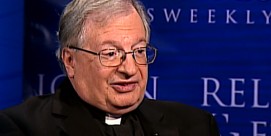BOB ABERNETHY, host: There were major efforts this week to prevent a US military strike against Syria. Secretary of State John Kerry began meeting with Russian officials to explore a possible agreement with Syria to turn over its chemical weapons to international supervision. Earlier, President Obama maintained his support for a strike but asked Congress to delay voting on it so the diplomatic talks could take place. Religious groups around the world, meanwhile, ramped up their opposition to US military action. At the Vatican, thousands joined Pope Francis at a prayer vigil for peace, and in Washington, Cardinal Timothy Dolan, head of the US bishops conference, warned against a military strike:
Cardinal Timothy Dolan: "We’ve learned the hard way that violence spurs more violence, and all the time it’s the innocent people, many of them, yes, suffering Christians and other vulnerable minorities, who pay the worst price."
Kim Lawton, our managing editor, joins me now to talk about the moral considerations regarding Syria with William Galston, a senior fellow at the Brookings Institution in Washington. Bill, welcome. What would be so bad about saying, “OK we're not going to send any missile strikes into Syria and you give up all your chemical weapons in return?” Isn't that pretty good deal?
WILLIAM GALSTON (Senior Fellow, Brookings Institution): At the end of the day those two issues may be linked, but right now, as Secretary Kerry has rightly said, it is only the threat of force that has brought the Syrians to this point, a point that they've resisted for decades. They have not been a signatory to the chemical weapons convention until, until the past few days. So that it is unrealistic to forswear the use of force unless and until an agreement can be reached that achieves the objectives.
KIM LAWTON, managing editor: Part of the issue for those who supported the military strikes was that it's not just a deterrent to prevent this from happening in the future, but that it would also have been a punishment to show Assad and whomever else that the world will not tolerate that. If there is a diplomatic settlement, does that in some way lessen the moral consequence of doing those kind of acts?
GALSTON: In a way it does and that's on one side of the moral scales. On the other side of the moral scales is the fact that the use of force is always, from the moral point of view, a last resort. Once you initiate the use of force not only will there be, inevitably, collateral damage, civilian deaths, but also unintended consequences. So with all of that on other side of the scale, if we can really achieve the internationalization and then the destruction of these terrible weapons that the world has forsworn for a century now then I think that's a very, that's a defensible bargain, but we're a long way from having reached that point unfortunately.
ABERNETHY: Bill, what happens if the diplomacy does not work? What happens if it just goes on and on and on and nothing?
GALSTON: Well, in my view the president and the secretary of state would be well advised to make it clear that this is not going to be an unending diplomatic process. We're not going to get sucked into a morass that leaves us months from now in the same place that we are now. And the president I think should make that crystal clear, whether he should issue an ultimatum with a date certain is a tactical question that I'll leave to others to determine. But he has to eliminate the possibility of an open ended negotiation.
LAWTON: There was an interesting exchange this week. At the end of his address on Tuesday, President Obama said we have to act, this is who we are, it's what makes America exceptional. Then the Russian president said back, “hey, it's dangerous to say we're exceptional. God created everybody equal.” What role does American exceptionalism, this idea that we're special, play in foreign policy and what should it play?
GALSTON: Well, let's reduce that idea to its practical essentials for current purposes. I mean American exceptionalism is an idea with a very long history and it has to do with the religious basis of the country, with our institutions, with out special history, with the universal principals that we stand for. But right now, practically, American exceptionalism means that the peace is secured through the presence of American power around the world. For example, the freedom of the seas in guaranteed by the United States Navy in a way, in the same way that in the previous century it was guaranteed by the British Navy. And if we were to stand down or move back, the result would not be spontaneous peace, it would be anarchy. If you like Somali pirates you'd see a lot more of them absent the U.S. Navy. So, American exceptionalism means, right now, that we're the only country with the ability to deter a bunch of bad guys from doing a bunch of bad things in all sorts of different areas.
ABERNETHY: But Bill, quickly, does that mean we have a responsibility to intervene any place in the world where dictators are doing bad things to their people?
GALSTON: Absolutely not. The president has made that point clear. But the fact that we have neither the responsibility nor the capacity to intervene everywhere doesn't mean that we have the right to intervene nowhere. We should do what we can consistent with possibility.
ABERNETHY: Bill Galston of the Brookings Institution, many thanks to you.
GALSTON: My pleasure.




